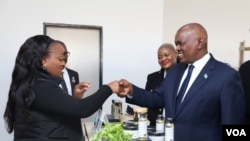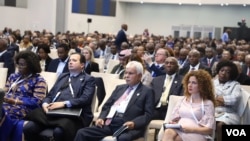Leaders at the U.S.-Africa Business Summit in Botswana have urged renewal of the long-standing Africa Growth Opportunities Act (AGOA).
The trade deal gives some African countries preferential or even tax-free access for their exports to the U.S. market. The agreement is due to expire in 2025, and African delegates at the summit want the deal renewed.
Botswana President Mokgweetsi Masisi, addressing delegates gathered in Gaborone for the summit, led the pleas to Washington to renew the arrangement.
Since it was put into place in 2000, AGOA has been credited with creating more than 46,000 jobs in Africa and bolstering exports to the U.S.
“It is also our earnest hope that in consonance with the letter and spirit of the U.S.-Africa Leaders Summit, the Biden administration will renew the African Growth and Opportunity Act initiative, which expires in 2025," he said. "The AGOA renewal now, with expanded mandates, will give a strong signal and confidence to the markets and serve as a catalyst for Africa's industrialization and inclusion into the global value chains."
Florie Liser, chief executive and president of the Corporate Council on Africa, which organizes the U.S.-Africa Business Summit, said there is a need to examine AGOA in light of an agreement known as the African Continental Free Trade Area.
"A lot has changed" in Africa and beyond since AGOA came into being, she said. "The advent of the African Continental Free Trade Area is fostering much closer economic and commercial integration on the continent, which will spur the creation of regional and continental value chains and increase value added across key sectors. In many ways, the question is how best we can support this development.”
The Atlantic Council Africa Center produced a report titled The Future of U.S.-Africa Trade and Investment, which analyzes the future of the AGOA. The report was issued Wednesday at the U.S.-Africa Business Summit.
Frannie Leautier, a senior fellow at the Atlantic Council and the report’s lead author, said, "On extending or renewing AGOA, the idea is to realize the potential of AGOA for long-term development through greater certainty, planning and skilled up support for capacity development and investment flow. The first [recommendation] is straightforward: just extend it. The second one is to provide longer-term certainty about AGOA eligibility, because investors are waiting for that. Nobody is going to invest now if they think AGOA is not going to be extended.”
Not all African countries benefit from AGOA. Some, like Ethiopia, Mali and Guinea, were barred because of coups and human rights violations. South Africa’s eligibility is being reviewed over the alleged sale of arms to Russia.
Meanwhile, Scott Nathan, chief executive of the U.S. International Development Finance Corporation, who is leading the U.S. government delegation at the summit, pledged continued support for Africa.
“[The] United States is focused on what we will do with African nations and people, and not for African nations and people," he said. "We work to deepen and understand our partnership, amplify African voices and support the empowerment of Africans.”
The summit has drawn more than 1,300 delegates, including leaders from Eswatini, Lesotho, Mozambique, Niger and Zimbabwe.






